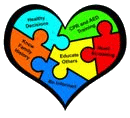Don’t do it! Don’t confuse Sudden Cardiac Arrest (SCA) and a heart attack…it drives me crazy!! These two often get confused, but be assured, they are extremely different. Let’s break it down…
Let’s think of a heart attack as a problem with the plumbing. A heart attack is caused by a blockage in a blood vessel, and it can happen as a result of multiple reasons (or combinations of reason) including poor nutrition, lack of exercise, and family genetics. This blockage, made up of plaque from cholesterol and fatty materials, prevents blood and oxygen flow. Once oxygen can not circulate, part of the heart muscle dies. There is a decent chance of survival from a heart attack depending on how fast you receive medical treatment. Heart attacks are more typical in older adults.
Sudden Cardiac Arrest, however, we’ll think of as a problem with the electricity. SCA occurs when there is an abnormal rhythm to how the heart is beating, and the heart just suddenly stops beating altogether. There is an extremely low chance of survival with an SCA, with some estimates saying less than 7%. In adults SCA can occur from a variety of reasons, including as a damage done by a past heart attack. With young people, however, SCA is typically caused by an underlying, often genetic heart condition that may not have any symptoms or warning signs. It’s the stories of young athletes dropping dead unexpectedly and tragically on the field. It’s the stories of the little children who don’t wake up in the morning. And now it’s thought to be the stories of some of the SIDS victims out there.
Understand how different a heart attack and an SCA are?? When we hear the stories about a young person dropping dead from a heart attack, chances are this was misreported. We wouldn’t make the mistake of saying a woman died from breast cancer when she actually died from lung cancer. They are both heart issues, they are both cancers…but that doesn’t make them the same. They have different causes, manifestations, and effects. Join my crusade in educating people about these differences! Through personal research and teaching others, we empower ourselves to lead healthier and stronger lives.



